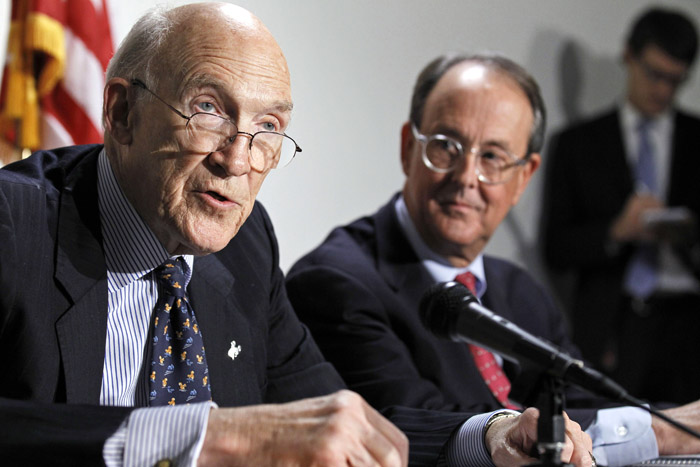WASHINGTON – A painful package of proposed spending cuts and tax increases drew sharp challenges from both the left and right on President Obama’s deficit commission Wednesday, putting approval in doubt. However, both parties’ budget point men in the Senate embraced the plan, and even opponents called it a starting point for efforts next year to control the nation’s ballooning debt.
“It’s a template that gives people an opportunity to start discussing what we have to do to get our fiscal house in order,” said Rep. Xavier Becerra, a California Democrat on the panel who hasn’t said whether he’ll support it.
The 18-member bipartisan commission scheduled a vote on the plan for Friday. But as Wednesday’s meeting demonstrated, the co-chairmen, Democrat Erskine Bowles and Republican Alan Simpson, face a difficult chore in rounding up the 14 votes needed to officially send the plan to Congress for consideration.
Winning over lawmakers who are also panel members appeared to be the biggest remaining challenge, given the politically incendiary nature of many of the proposals. The tax increases it includes are deal-breakers for some Republicans, as social program cuts are for some Democrats.
The plan calls for sweeping tax changes that would affect millions of Americans, including trimming or doing away with many popular tax breaks such as the home mortgage deduction. It also would make deep cuts in military spending, slash the federal work force, raise the retirement age for full Social Security benefits and make cuts in Medicare. It aims to reduce federal deficits by nearly $4 trillion within a decade.
Although prospects for the plan are unclear, the attention it has received has helped awaken the nation to the depth of the economic hole the country is in and the need for bold action to dig out, suggested Bowles, who was former President Bill Clinton’s White House chief of staff. Simpson is a former Republican senator from Wyoming.
“The American people get it now. People want this to happen,” Bowles said.
As the deficit commission — formally the president’s National Commission on Fiscal Responsibility and Reform — began moving toward a final decision, Sens. Kent Conrad and Judd Gregg, the Democratic chairman and top Republican on the Senate Budget Committee, threw their high-voltage support behind the plan. Still, both expressed some misgivings.
Gregg, who is retiring from his Senate seat representing New Hampshire, took issue with some proposed tax increases in the plan, sounding a familiar GOP theme that taxes should be lower, not higher, to promote growth. Still, he said, the overall plan was “moving dramatically in the right direction.”
Conrad, D-N.D., said there were “things in this plan that I dislike intensely.” Yet he said he was prepared to support it “and support it strongly. I don’t see another alternative.”
They were joined in supporting the package by panel members Alice Rivlin, the White House budget director in the Clinton administration, David Cote, CEO of Honeywell International, and Ann Fudge, a former chief executive of Young & Rubicam.
“This is the framework for us to move forward,” Fudge said.
Counting Simpson and Bowles, that put seven of the panel’s 18 members on the record in support for the proposal.
Bowles and Simpson have acknowledged it will be hard to assemble the 14 votes needed to give the deficit-reduction plan a direct ticket to congressional consideration, but they and other commission members have noted that Congress can still take up the ideas.
Send questions/comments to the editors.



Success. Please wait for the page to reload. If the page does not reload within 5 seconds, please refresh the page.
Enter your email and password to access comments.
Hi, to comment on stories you must . This profile is in addition to your subscription and website login.
Already have a commenting profile? .
Invalid username/password.
Please check your email to confirm and complete your registration.
Only subscribers are eligible to post comments. Please subscribe or login first for digital access. Here’s why.
Use the form below to reset your password. When you've submitted your account email, we will send an email with a reset code.